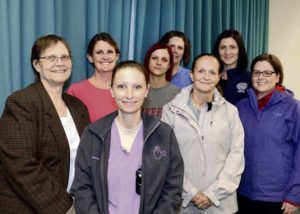From the Azores of Portugal to the Black Sea, United States military operations throughout Europe are continuous, sustaining the U.S. military’s ability to rapidly deploy combat-ready forces across the theater of operations.
To support the needs of Service Members, medical professionals are regularly assigned to deployed units; however, a special class of healthcare experts offer a unique service during distressing times.
“[The Army Sexual Assault Medical Forensic Examiner program] is not one everybody really knows or understands and it’s a small group of healthcare professionals,” said Florence Hare, the sexual assault medical director and program manager at Landstuhl Regional Medical Center. “This environment of care which we’ve created in the Military Health System is really locked in research and shows [that these] patients… have far fewer long term negative health effects, heal faster, and have a quicker behavior health recovery.”

Military Sexual Assault Medical Forensic Examiners are physicians, physician assistants, nurse practitioners, certified nurse midwives and registered nurses who undergo specialized education and training in the provision of trauma-related healthcare as well as the performance of forensic medical examinations. Certified medical staff work in coordination with other responders to meet the medical and behavioral health care needs of adolescent and adult sexual assault patients, to include documenting and collecting forensic information.
According to Hare, the SAMFE providers represent a wide array of medical specialties from multiple geographical locations.
“The forensic program here is really unique in that we don’t only see patients here in the emergency room for forensic exam or care, we also have a 24/7 on-call mobile team to go anywhere there are U.S. Army aid stations, clinics, anywhere military medical care is being delivered],” said Hare, an adult nurse practitioner by trade at LRMC. “We go to the patient and take the forensic exam to them.”
The team’s ability to deploy helps support the medical needs of unit commanders across the European theater and operational environments. Additionally, SAMFE providers ensure rotating deploying units are aware of the resources available to ensure timely responses to any forensic examination needs in deployed environments and provide consultation for deploying SAMFEs while in Europe.
“It’s really a unique setting where you deal with different patient experiences and situations,” said Liudmyla Nelson, a SAMFE provider and registered nurse with LRMC’s Medical Surgical Unit. “When something traumatic happens in a patient’s life, it’s important to approach it in a specific manner that will not re-traumatize them because it’s pretty sensitive.”
Examiners undergo rigorous training at Joint Base San Antonio, Texas, to prepare them for the sensitive nature of the profession. Hare, a veteran forensic examiner of 20 years, led the training course which consists of information on sexual violence dynamics and prevalence, skills to properly care for victims of sexual assault, the collection and preservation of evidence using the Department of Defense Sexual Assault Evidence Collection Kit, identification of common injuries resulting from sexual assault, understanding the criminal justice system, sex offending behavior, working with military and civilian Sexual Assault Response Teams, and providing skills for testifying in military court as a fact or expert witness.
According to Hare, the program is unique to military medicine because the civilian equivalent, Sexual Assault Forensic Examiners, do not concentrate on the Uniform Code of Military Justice or the relationship between military Criminal Investigation Divisions, other authorities and the military medical treatment facility.
“(Examiners) also work with patients who may not choose to have a forensic exam but have had a sexual assault experience,” said Hare. “We want to ensure they understand any interventions we may offer, such as behavioral health, medical care and so forth.
Hare, a native of Watertown, New York, said that the approach taken with patients is rooted in empowerment.
“The one thing a sexual assault survivor has had removed from their life is power and control,” said Hare. “One of the first principles we teach SAMFEs is to allow every opportunity to give back power and control to survivors. We are only there to help guide them in their decisions, but it’s their decision (on how to go forward).”
Although a sensitive and difficult position for most individuals, examiners find purpose in patients’ recovery.
“These patients are in a place where they might not have ever been before, where they feel helpless and sad. We get to see those patients grow back into healthy, productive people and that’s the whole idea,” said Hare. “(The program) is not centered on the forensic exam, it’s centered on the patient and their experience.”


